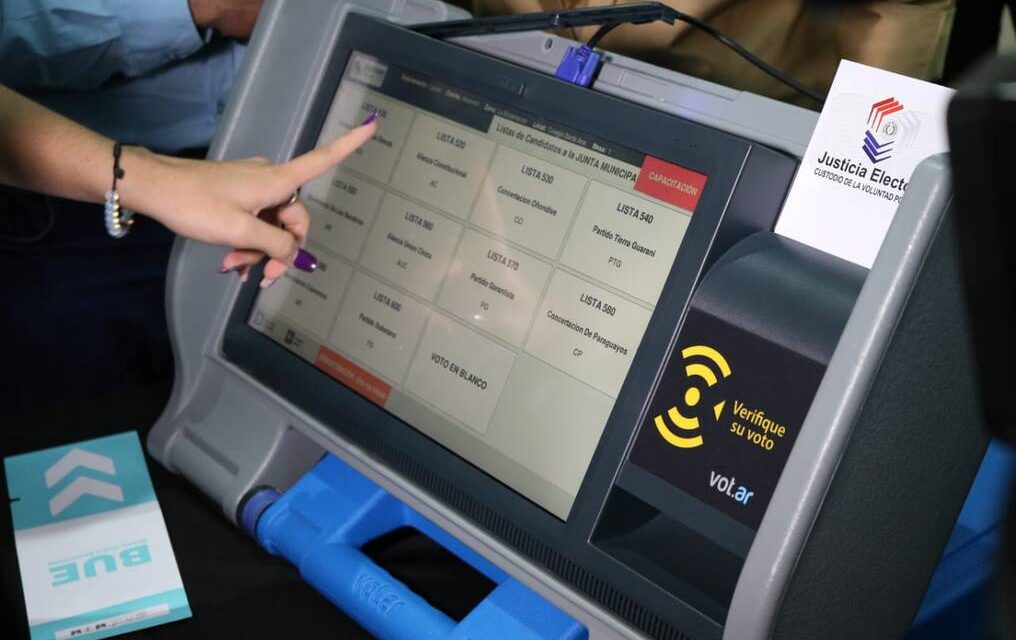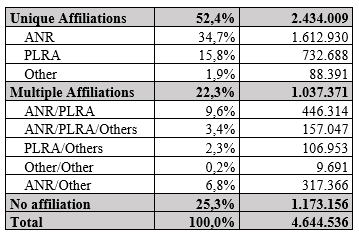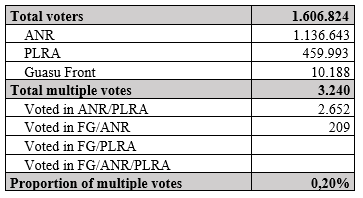
By Rodrigo Ibarrola
On July 8, the Superior Court of Electoral Justice (TSJE) finally aknowledged the National Concertation. In the same act, it also resolved the controversy over the use of the Permanent Civic Registry (RCP) for the formation of the electoral roll to be used in the internal elections of December 18 with a ruling in favor of the Concertation. As a result of this new development, various doubts have arisen, both from the Colorado Party and from TSJE officials.
From within the Colorado Party, the Cartismo members, such as Congressman Basilio “Bachi” Núñez and the party’s own representative, Eduardo González, have referred to the resolution as nonsense, since the RCP includes both those disqualified as well as military and police officers.
At this point, it should be clarified that the RCP is not a register itself, but is the complete and raw list of persons registered as voters who are eighteen years old or will turn eighteen by the day immediately preceding the elections, provided they are not included in the grounds for exclusion of Article 114 of the Electoral Code. In addition, the RCP is permanently updated and purged, excluding persons who are deceased and declared presumed dead by a court ruling, persons disqualified or declared interdicted, repeated registrations, registrations made fraudulently, those absent from the country for more than five years, and those crossed out (art. 149). This is done on the basis of communications from the Civil Registry of the Status of Persons, judges and courts, as well as the General Directorate of the Armed Forces Recruitment and Mobilization Service. After the official cleanse and the period for objections and complaints, what is known as the “voter list” is drawn up, which is the definitive list of voters registered in the Permanent Civic Registry who are eligible to vote.
Therefore, the assertion made by his detractors such as “Bachi” or the lawyer Gonzalez, responds more to a political motivation rather than a legal one, since all this process is known by them, or, it should be, at least by the attorney-in-fact.
On the other hand, on July 15, Ñandutí published an article called “Five million Paraguayans could vote twice with the use of the National Register, warns Ljubetic,” a headline that implies the existence of an imminent danger of massive double voting, based on the declarations of the director of electoral processes of the TSJE, Carlos María Ljubetic. However, this headline does not reflect what was really expressed by the director, who only pointed out that this possibility always exists during the celebration of the internal party elections due to the amount of double affiliations that are registered in the parties, and that the difference on this occasion lies in the number of voters with the capacity to do so on December 18, which would be about five million voters. This, by no means, means that this is going to happen. In this regard, let’s look at some numbers.
as strategic as the idea of the ruling party diverting resources -and votes- to influence the National Concertation’s internal elections may seem, it is unlikely to materialize, given the competitiveness that always surrounds the ANR’s internal elections, especially with regard to the presidential candidates. In this dispute, in practice, it is impossible to estimate the votes needed to finally win the presidency.
Of the electoral universe of the 2021 municipal elections (Table 1), 22.3% of the total of 4,644,536 voters of the national electoral roll registered multiple affiliation, that is, about 1,037,371 people. According to the logic of the director of electoral registration of the TSJE, this would be the number of people capable of double voting.
Table 1. National Register, by affiliation, Municipalities 2021

Source: Own elaboration with data from the TSJE.
Certainly, this number rises with the ruling of the TSJE in relation to the electoral roll to be used by the National Concertation. However, there is an error in the figures in Ljubetic’s logic, since only those affiliated to a party would be eligible for double voting, but these do not add up to five million, but 3,471,380.
With regards to the double vote, the available data corresponds to the municipal internal elections held in 2015, when they were not yet carried out simultaneously in their entirety, so much so that on one day the elections corresponding to the ANR and the PLRA were held, and on another day those of the other parties. The reports of the TSJE, which analyzed the elections of the ANR, PLRA and the Frente Guasu coalition, reported that, out of a total of 1,606,824 voters, only 3,240 people incurred in such a situation, that is, 0.2% (Table 2).
Table 2. Voters, Internal Elections for the 2015 Municipal Elections

Source: Own elaboration with data from the TSJE.
It should be noted that the Electoral Code, in its Article 323, establishes a penalty of one to three years imprisonment plus a fine of 200 minimum wages (₲19,617,800) for those who vote more than once. In addition, the technology existing today, makes this detectable very quickly, which once discovered is reported to the Public Prosecutor’s Office with supporting documents.
On the other hand, as strategic as the idea of the ruling party diverting resources -and votes- to influence the National Concertation’s internal elections may seem, it is unlikely to materialize, given the competitiveness that always surrounds the ANR’s internal elections, especially with regard to the presidential candidates. In this dispute, in practice, it is impossible to estimate the votes needed to finally win the presidency.
To sum up, both the close nature of the internal elections and the available data lead us to assume that the phenomenon is quite atypical in internal elections and does not jeopardize the legitimacy of the results of the internal elections.
Cover image: ADN Digital
